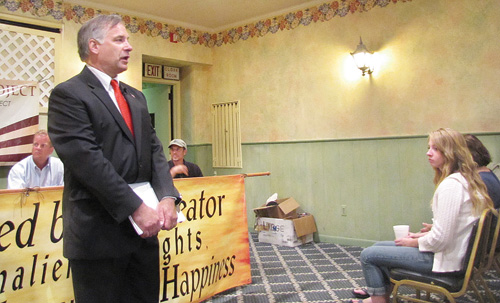Supervisor longshot calls for town power authority

Riverhead Town supervisor candidate Greg Fischer’s proposal to create a town power authority and break away from LIPA got a bumpy reception from members of the Suffolk 9-12 project last Wednesday at Polish Hall in Riverhead, where Mr. Fischer spoke at the group’s monthly meeting.
The group, a local branch of an organization formed by Conservative talk show host Glenn Beck and associated with the tea party movement, seemed to turn on Mr. Fischer once he began talking about global warming and its effects.
Mr. Fischer, who currently is the publisher of Political Patriot newspapers, is running a Democratic primary for supervisor in September against former supervisor Phil Cardinale, and plans to be on the November ballot on at least one minor party line.
He also attempted to run a primary on the Independence Party line against Republican incumbent Sean Walter but was unable to get approval from Independence Party chairman Frank MacKay.
Mr. Fischer says a centerpiece of his campaign is his proposal calling for the creation of a separate power authority in Riverhead Town, a move he says would allow the town to immediately begin purchasing lower-priced energy and replacing LIPA.
In 2002, during the administration of Bob Kozakiewicz, the Town Board considered putting a referendum on the ballot to determine if the public wanted to create a town power authority. It never got that far, however, because the Town Board had cost disputes with the company proposing to set up the authority.
Mr. Fischer says forming a new power authority would not only lower utility rates for residents of Riverhead Town but also drastically lower taxes, because the town’s utility costs would drop.
“I actually figured out what will turn this town around,” Mr. Fischer told the 9-12 group Wednesday, referring to the power authority proposal.
He said Greenport, Freeport and Rockville Centre all have their own municipal power authorities and all have drastically lower power rates than LIPA. Greenport, Mr. Fischer said, pays 40 percent less than LIPA. Freeport’s rates are also about 40 percent lower than LIPA, and Rockville Centre’s are about 32 percent lower, according to Freeport’s website.
Those three municipal power authorities are the only ones on Long Island independent of LIPA. All were built before LIPA and its predecessor, LILCO, so they didn’t have to pay the cost of acquiring LIPA’s distribution system.
Mr. Fischer said natural gas is now deregulated, so Riverhead could begin buying natural gas immediately upon getting an authority and using it to generate power. And he said natural gas is cheaper than diesel, which is what Greenport uses in its power plants, so Riverhead should save more than the 40 percent Greenport saves compared to LIPA.
“We have seen the lawn signs from Conservative candidates saying they will cut taxes, but taxes have never gone down,” he said. “But this will lop 20 percent off the taxes immediately.”
“How does something like this get built?” he was asked. He said the first step is a political one, creating the authority. From there, the town can immediately buy power from natural gas suppliers.
Mr. Fischer said there also are ecological benefits to buying natural gas.
“NASA scientists, non-partisan scientists, have said that if we don’t stop all the coal-fired plants on the planet, in 40 years we may cease to exist,” he said. “This is real stuff.”
“Let me ask you something,” said Bob Meyer, the president of Suffolk 9-12. “Do you believe that?”
“I think it might happen,” Mr. Fischer said. “We’re seeing a trend right now with the ocean of dying coral reefs, and we’re seeing the plankton in the oceans is dying.” He said plankton “creates a lot of the oxygen for the planet.”
Asked specifically what he thinks about global warming, Mr. Fischer said, “I think it’s not global warming, I think it’s the variations of temperatures. I don’t think it’s necessarily warming, I think it may be greater swings because of the variance in the atmosphere.”
Asked if he thought this phenomenon was man-made, he said he thought there was a man-made component to it.
“But what I’m really concerned about is pollution and deoxygenation, and this is only one step toward curing the problem,” Mr. Fischer said.
“I wouldn’t pitch it that way to this group,” a 9-12 member said from the audience, which then began laughing. “What I want to know is where are you going to get the money to build this?”
Mr. Fischer said you would have to float a bond to pay for the system, but the reduction in energy rates would offset the maintenance and retrofitting costs of the power system.
“I get that you guys don’t like the global warming thing,” Mr. Fischer said to the audience.
But that wasn’t all they didn’t like.
“You’re talking about creating jobs, would these be government jobs?” another audience member asked. When Mr. Fischer said it would be government employees running the power system, 9-12 members raised concerns that those employees would be covered by a government employee’s union. If that’s the case, they said the employees would eventually be getting big benefit packages, regular contractual salary increases and, as one man said, “we’re not going to see any rate reduction.”
Mr. Fischer reiterated the cases of Greenport, Freeport and Rockville Centre, which are government-owned and still have lower rates than LIPA.
One woman in the audience said her family comes form Rockville Centre and she worked in Freeport for many years.
“I cannot tell you the amount of times the electric was down,” she said. “The wind blows, everything goes down. It’s not a good system.”
Mr. Fischer said that under his proposal, the town wouldn’t be entirely off the LIPA grid and would still have LIPA available for backup.
He asked the group what their plan for cutting taxes would be if they don’t like this plan.




